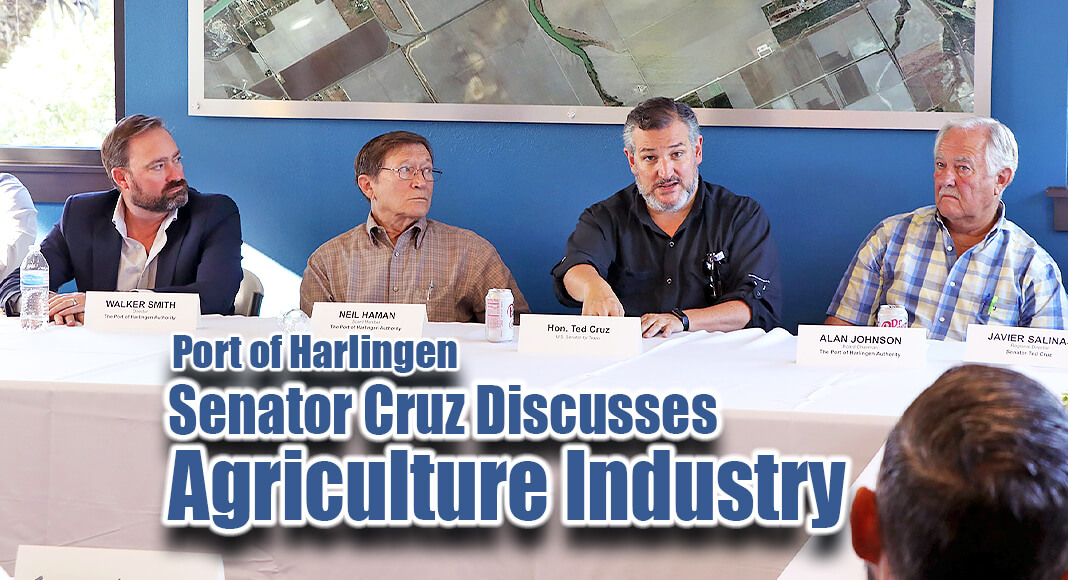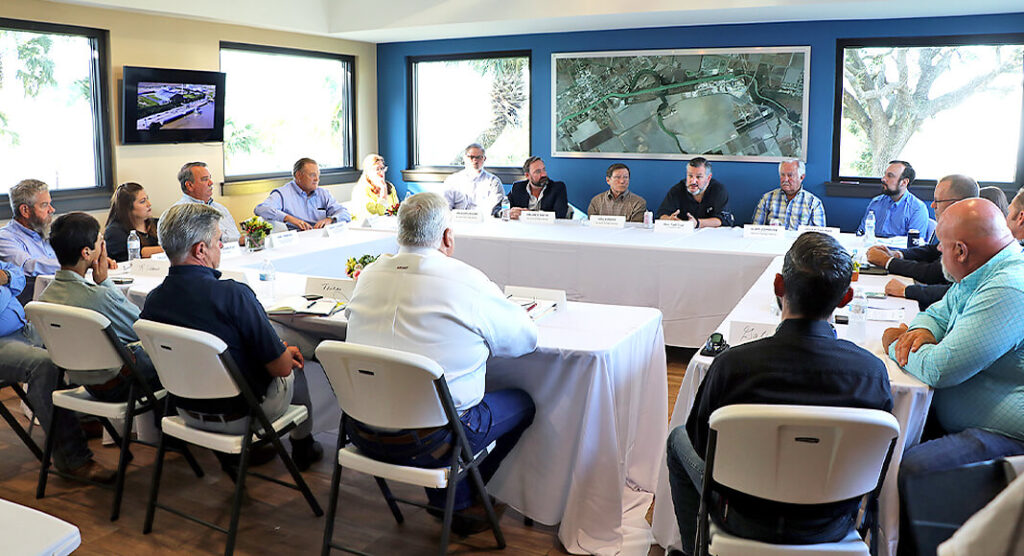
Texas Border Business
HARLINGEN, Texas – The Port of Harlingen hosted Senator Ted Cruz (R-Texas) for a roundtable Monday, August 28, with members of the local agriculture industry leaders to discuss important issues and provide an update on matters in Washington, D.C. that affect our region.
As part of a three-day tour focusing on the needs of agriculture, Cruz invited industry leaders and stakeholders from cotton, sugar, Texas Department of Agriculture, citrus, produce, grain, and local farmers organizations to shed light on major issues of the South Texas and the Rio Grande Valley.

“The ag community represents who we are as Texas. Aside from the fact that you feed and clothe us, and keep us alive, you do more than that in terms of just the culture of who we are,” Cruz said. “It is an on-going priority to be fighting for the betterment of South Texas.”
Although on-going legislation including The Farm Bill, a complex bill that builds on the 2018 Farm Bill theoretically set to pass by Sept. 30, was a center of discussion, a hot button issue was the area’s lack of water and the U.S./Mexico Water Treaty. The bi-national treaty set in 1944 between Mexico and the United States for the Utilization of Waters of the Colorado and Tijuana Rivers and of the Rio Grande, has been an escalating issue with lack of rain and disputes between the bordering countries.
The treaty states Mexico was supposed to have provided the United States with all of the water from the Rio Grande it owes the United States every five years. Currently, Mexico owes 1.75 million acre-feet of water to deliver to the United States for this five-year cycle, which began in 2020. And as of Aug. 12, the country has only paid 359,907-acre feet of water, according to data from the International Boundary and Water Commission, the agency that oversees the treaty.
“We are trying to be proactive now and put the pressure on Mexico now instead of letting the cycle end to bring relief to local farmers, ranchers and municipalities,” said Sonny Hinojosa, General Manager, Hidalgo County Irrigation District #2. “We have spoken with farmers in the state of Tamaulipas, and because they are in the lower basin they are in the same boat we are. They are in agreement and can be an ally.”
Agriculture leaders stressed the impact is not only on farmers and ranchers but creates a ripple effect of consequences throughout the region. Low water levels mean rising cost of water, which drastically impacts area colonias that may not be able to afford the cost. Low river levels can also be impactful to the environment and wildlife that depend on area water for survival, including endangered species.
Beyond direct impact, less agriculture means less jobs not only for regional workers that rely on agricultural jobs, but also any industry that utilizes agriculture products, including The Port of Harlingen.
“There are hundreds of direct jobs that will be affected by those who utilize the port. If we don’t get water, if we don’t get rain, those jobs are not just affected by that one organization, its down the chain, all the way across, everyone here at The Port of Harlingen will be affected,” said Port Director Walker Smith. “Regionally, jobs are going to be lost because money is not being pumped into the economy because of the agriculture jobs lost.”
Smith said looking ahead, The Port of Harlingen is planning for more diversification of commodities to offset the outlook of the trending agriculture decline in South Texas. Of the more than 3.2 million tons of commodities moving through the Port, it includes 90% of the fertilizer used by local farmers and 1/3 of the Rio Grande Valley’s cotton crop.
“We are the only Agriculture Port in South Texas, and we are very proud to be an agriculture port,” he said. “So, we are appreciative to have this opportunity to voice our concerns and the needs of the region because it affects more than just one organization.”
Leaders also argued the impact goes even beyond the region to outlying industries growing the economic repercussion.
“So you think not only about the farmers and mill workers, but then you got the trucks, agro-chemicals, packaging, everything that goes into it, so that is several thousand. Then you look at all the industries impacted, that can go six, seven, eight months without work,” said Dante Galeazzi, President of the Texas International Produce Association. “Then you also talk about international produce, crossing the border. That’s another probably 70 to 80,000 jobs along the border, groceries stores by that produce. So you are talking now somewhere north of 100,000 jobs that will be impacted if we don’t get water.”
Cruz encouraged attendees to continue to provide him information for their issues. He said he planned to look for leverage points and a bipartisan effort to find relief for the local agricultural industry.
“(Mexico) has been failing to meet with those treaty obligations and that is hurting the Rio Grande Valley. We will be pressing on the State Department and Biden Administration to demand that needs are met” Cruz said. “We are ferocious in improving the infrastructure of our Ports and I will say for the Farm Bill, we are deeply involved and making sure the interests of the farmers in Texas are reflected in the Bill.”













